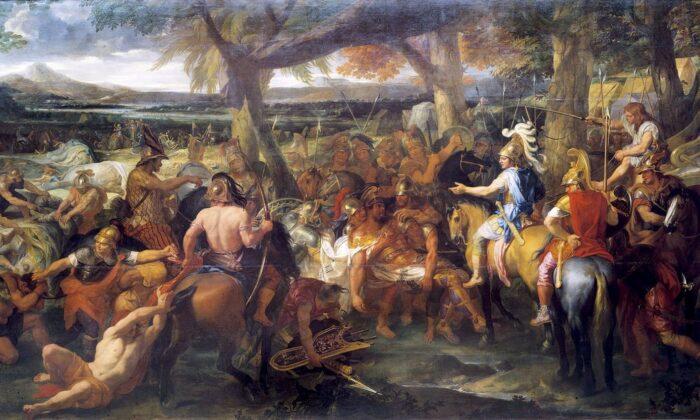MICHIGAN—With over 30,000 acres of vacant land, it’s hard to drive down a Detroit street without seeing overgrown lots and abandoned, sometimes decomposing, buildings. Arson and crime are a continuing problem, and unemployment is at more than 25 percent, well over the nation’s average of about 10 percent.
Unlike in most big American cities where land is an asset, in Detroit it can be a liability. There are opportunities to buy a foreclosed house for as little as $1 in Detroit.
Mayor Dave Bing is currently moving forward with a plan to demolish 10,000 vacant houses and “shrink” the Motor City to match a population that has shrunk to about half of what was in 1950, when the American auto industry was thriving.
“We got trapped by our own success, now we have to reinvent ourselves,” said John Hantz, one of the few multi-millionaires left within Detroit’s city limits.
A few years ago, Hantz decided it was time to invest in his city of 20 years. He hatched a plan to use $30 million of his own money to buy up a large quantity of Detroit’s cheap land and farm it for everything its worth—an unprecedented feat.
Though delayed for about a year, Hantz estimates that he will start with 250 to 280 acres by spring 2011, making it the largest urban farm in the world. First crops will include apples, tomatoes, lettuce, and even wood—trees will help in purifying the soil, and the long-term cost-benefit of wood is viable, according to Hantz.
How It Started
While driving to his office in the suburbs of Detroit (the reverse route of most local commuters) about two years ago, Hantz realized that if he really wanted Detroit to change for the better, he would have to stop looking to others.
“I was thinking, well someone needs to do something, and then I had that hated dreadful feeling that someone might be, like, me,” Hantz said.
He then decided that what Detroit needs is scarcity of land.
Unlike in most big American cities where land is an asset, in Detroit it can be a liability. There are opportunities to buy a foreclosed house for as little as $1 in Detroit.
Mayor Dave Bing is currently moving forward with a plan to demolish 10,000 vacant houses and “shrink” the Motor City to match a population that has shrunk to about half of what was in 1950, when the American auto industry was thriving.
“We got trapped by our own success, now we have to reinvent ourselves,” said John Hantz, one of the few multi-millionaires left within Detroit’s city limits.
A few years ago, Hantz decided it was time to invest in his city of 20 years. He hatched a plan to use $30 million of his own money to buy up a large quantity of Detroit’s cheap land and farm it for everything its worth—an unprecedented feat.
Though delayed for about a year, Hantz estimates that he will start with 250 to 280 acres by spring 2011, making it the largest urban farm in the world. First crops will include apples, tomatoes, lettuce, and even wood—trees will help in purifying the soil, and the long-term cost-benefit of wood is viable, according to Hantz.
How It Started
While driving to his office in the suburbs of Detroit (the reverse route of most local commuters) about two years ago, Hantz realized that if he really wanted Detroit to change for the better, he would have to stop looking to others.
“I was thinking, well someone needs to do something, and then I had that hated dreadful feeling that someone might be, like, me,” Hantz said.
He then decided that what Detroit needs is scarcity of land.
“Vacant land is a train wreck, it destroys land, it destroys community,” he said. “The worst part of vacant land is that it consumes the city’s resources.”
Hantz’s estimate, confirmed by the city, indicates that each parcel of vacant land in Detroit costs the city about $2,400 a year to maintain, when various services, such as police protection, fire protection, and lawn mowing, are accounted for. With 200,000 vacant parcels, that amounts to a $480 million-a-year tab. It’s no surprise that Detroit currently faces a budget deficit of more than $300 million.
Even if Hantz Farms fails, just by taking over the land and mowing its grass, Hantz will be doing the city a service—relieving it of approximately $3.5 million in maintenance fees. If he pays his taxes on the land, which he said he will, he will also be giving the city money over and above that.
Hantz concedes that Hantz Farms is a “little thing” amid a big problem in Detroit, but he hopes it will be inspirational to over 700,000 residents of the city, who can also acquire ownership of city land for farming.
“Even if you add up 700,000 people doing a little thing, you get a pretty big thing—that’s the pendulum that I am hoping the farm impacts,” he said.
Making It Work
Hantz Farms won’t be a typical farm with sprawling fields. Hantz has consulted with agricultural experts at Michigan State University and the Kellogg Foundation and plans on using all the agricultural ingenuity the modern world can afford to make his endeavor work. His 250 to 280 acres will be split up into “pods” throughout the city and will grow vertically. He eventually plans to incorporate aquaculture (fish farming), hydroponics (growing plants in water), and aeroponics (growing plants in air), all of which can be housed in buildings.
Some have worried that Detroit soil may no longer be suitable for farming. Hantz Farms will initially limit itself to former residential properties, not commercial buildings, in order to cut down on the possibility of difficult land.
“That’s going to be one of our biggest costs, going through the parcels,” Hantz said.
An increasing number of community gardens in Detroit—from approximately 80 in 2003 to 1,300 at present—seem to attest to the viability of Detroit’s soil. According to Dan Carmody, the head of Detroit’s mammoth farmer’s market, Eastern Market, there are a variety of solutions to Detroit’s soil quality.
“There are short-term solutions, there are long-term solutions, but [the soil quality] should not be an impediment,” Carmody said in a panel discussion at the University of Michigan, Dearborn.
He cited the planting of sunflowers, which can leech heavy metals out of soil, and also said that 12 inches of top soil can be simply put on top as a viable solution.
Down the Street
John Hantz lives on Iroquois Street in Indian Village, one of few affluent neighborhoods left in Detroit. His manicured lawn and grand home seem like a relic of Detroit’s glory days.
Hantz’s estimate, confirmed by the city, indicates that each parcel of vacant land in Detroit costs the city about $2,400 a year to maintain, when various services, such as police protection, fire protection, and lawn mowing, are accounted for. With 200,000 vacant parcels, that amounts to a $480 million-a-year tab. It’s no surprise that Detroit currently faces a budget deficit of more than $300 million.
Even if Hantz Farms fails, just by taking over the land and mowing its grass, Hantz will be doing the city a service—relieving it of approximately $3.5 million in maintenance fees. If he pays his taxes on the land, which he said he will, he will also be giving the city money over and above that.
Hantz concedes that Hantz Farms is a “little thing” amid a big problem in Detroit, but he hopes it will be inspirational to over 700,000 residents of the city, who can also acquire ownership of city land for farming.
“Even if you add up 700,000 people doing a little thing, you get a pretty big thing—that’s the pendulum that I am hoping the farm impacts,” he said.
Making It Work
Hantz Farms won’t be a typical farm with sprawling fields. Hantz has consulted with agricultural experts at Michigan State University and the Kellogg Foundation and plans on using all the agricultural ingenuity the modern world can afford to make his endeavor work. His 250 to 280 acres will be split up into “pods” throughout the city and will grow vertically. He eventually plans to incorporate aquaculture (fish farming), hydroponics (growing plants in water), and aeroponics (growing plants in air), all of which can be housed in buildings.
Some have worried that Detroit soil may no longer be suitable for farming. Hantz Farms will initially limit itself to former residential properties, not commercial buildings, in order to cut down on the possibility of difficult land.
“That’s going to be one of our biggest costs, going through the parcels,” Hantz said.
An increasing number of community gardens in Detroit—from approximately 80 in 2003 to 1,300 at present—seem to attest to the viability of Detroit’s soil. According to Dan Carmody, the head of Detroit’s mammoth farmer’s market, Eastern Market, there are a variety of solutions to Detroit’s soil quality.
“There are short-term solutions, there are long-term solutions, but [the soil quality] should not be an impediment,” Carmody said in a panel discussion at the University of Michigan, Dearborn.
He cited the planting of sunflowers, which can leech heavy metals out of soil, and also said that 12 inches of top soil can be simply put on top as a viable solution.
Down the Street
John Hantz lives on Iroquois Street in Indian Village, one of few affluent neighborhoods left in Detroit. His manicured lawn and grand home seem like a relic of Detroit’s glory days.
About a mile down on Iroquois Street—no longer in Indian Village—lives Earnest Sanders, a retired General Motors factory worker who has lived in his Detroit home for 47 years. His two-level house is more modest in size than Hantz’s, but the two Detroit residents share an affinity for manicured lawns.
Sanders lives directly across from Pingree Park, a sprawling plot with three-feet-high weeds. Next to the park is an abandoned school, where locals do drugs, he said.
While he’s proud of his community of neighbors on Iroquois Street, Sanders said, there are a lot of “no-gooders” just a block away.
“We’re people with values and morals, but we’re surrounded by people who don’t have values and morals,” he said on his porch overlooking the park.
Pingree Park would not be a possible area for a Hantz farm, since it’s a city park, but the abandoned school next door could, in theory, be bulldozed and sold to Hantz. Money saved and taxes collected from such a farm could probably pay for more regular maintenance on the untended park next door.
Asked to comment on Hantz Farms, Sanders said, “If you can produce something that’s beneficial to the community, that’s wonderful.”
Sanders lives directly across from Pingree Park, a sprawling plot with three-feet-high weeds. Next to the park is an abandoned school, where locals do drugs, he said.
While he’s proud of his community of neighbors on Iroquois Street, Sanders said, there are a lot of “no-gooders” just a block away.
“We’re people with values and morals, but we’re surrounded by people who don’t have values and morals,” he said on his porch overlooking the park.
Pingree Park would not be a possible area for a Hantz farm, since it’s a city park, but the abandoned school next door could, in theory, be bulldozed and sold to Hantz. Money saved and taxes collected from such a farm could probably pay for more regular maintenance on the untended park next door.
Asked to comment on Hantz Farms, Sanders said, “If you can produce something that’s beneficial to the community, that’s wonderful.”





Friends Read Free